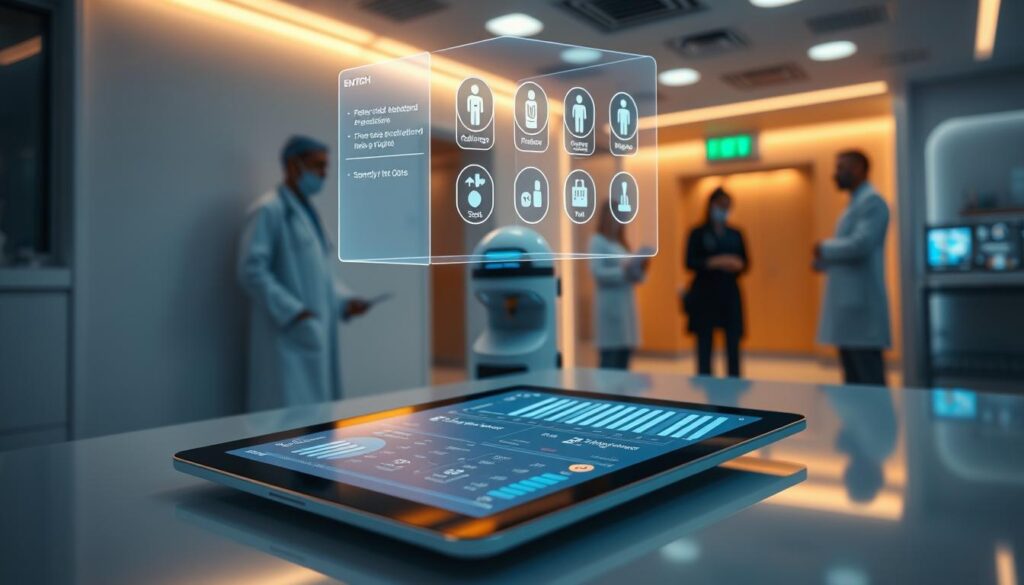Living with a chronic condition is like trying to find your way through a maze. I saw my grandmother face many health challenges, feeling lost and alone. Now, technology is changing how we manage chronic diseases, offering hope and control.
Digital therapeutics are changing the game for patients. They offer personalized care based on data. These technologies are making healthcare better by giving targeted help to those with complex health issues.
These eight digital therapies are making a big difference. They help with diabetes and mental health, among other things. They use advanced tech and data to help manage health in a new way.
Key Takeaways
- Digital therapeutics offer personalized chronic condition management
- Advanced software solutions enhance patient engagement
- Technology provides comprehensive health tracking and intervention
- Mobile platforms enable remote patient monitoring
- Innovative solutions reduce healthcare complexity
- Data-driven approaches improve treatment outcomes
- Patient empowerment is at the core of digital health solutions
Understanding Digital Therapeutics and Their Impact on Healthcare
Digital therapeutics have changed healthcare a lot. They mix technology with medical treatment in new ways. These apps help manage chronic conditions and make patient care better.
The digital health world has grown fast. It now uses advanced tech to help patients. This tech helps with behavioral health in a big way.
The Evolution of Digital Health Solutions
Digital health has changed a lot in the last 10 years. Some big changes include:
- Artificial intelligence in diagnosis
- Watching patients in real time
- Custom treatment plans
- Better data collection and analysis
Regulatory Framework and FDA Approvals
The U.S. Food and Drug Administration has strict rules for health apps. These rules make sure apps are safe and work well.
| Approval Category | Key Requirements | Implementation Year |
|---|---|---|
| Class I Digital Therapeutics | Low-risk medical devices | 2015 |
| Class II Digital Therapeutics | Moderate-risk medical interventions | 2018 |
| Class III Digital Therapeutics | High-risk medical technologies | 2020 |
Benefits for Healthcare Providers and Patients
Digital therapeutics bring big benefits to doctors and patients. Continuous monitoring and data-driven insights lead to better care. This makes healthcare cheaper and more effective.
- Improved treatment adherence
- Lower hospital readmission rates
- Better patient engagement
- Custom healthcare plans
How Digital Therapeutics Are Revolutionizing Chronic Disease Management
Digital therapeutics are changing how we manage chronic diseases. They offer new software solutions for chronic disease management. These tools help patients track and improve their health better than before.
Remote patient monitoring is a big step forward in healthcare. Patients can now check their health signs, medicine, and disease progress. They use apps and wearables for this.
- Real-time health data tracking
- Personalized treatment recommendations
- Reduced hospital readmission rates
- Enhanced patient engagement
Healthcare providers also gain a lot from these digital tools. Chronic disease software solutions let doctors see detailed patient data. This helps them make better, quicker decisions.
| Digital Therapeutic Benefit | Patient Impact | Healthcare System Impact |
|---|---|---|
| Continuous Monitoring | Improved Self-Management | Cost Reduction |
| Data-Driven Insights | Early Intervention | Streamlined Care Delivery |
| Personalized Feedback | Enhanced Treatment Adherence | Reduced Healthcare Burden |
Technology gives patients more control over their health. It makes healthcare systems more efficient and focused on each patient’s needs.
Diabetes Management Apps: Leading the Digital Health Revolution
Digital health technology is changing how people with diabetes manage their health. Mobile health apps are now key tools. They let patients control their health with great precision and ease.
Diabetes management apps are a big step forward in healthcare. They offer full support for those dealing with diabetes. This makes managing diabetes easier and more personal.
Advanced Blood Glucose Monitoring Features
Today’s diabetes apps have top-notch blood glucose tracking:
- Real-time glucose level tracking
- Continuous glucose monitor integration
- Trend analysis and predictive insights
- Customizable alert systems
Intelligent Insulin Management
Smart mobile health apps now help with insulin tracking and dose calculation:
- Automated insulin dose recommendations
- Personalized insulin-to-carbohydrate ratio calculations
- Medication adherence reminders
- Comprehensive insulin usage history
Comprehensive Nutritional Guidance
Diabetes apps also offer comprehensive nutritional support. They use artificial intelligence for:
- Personalized meal planning
- Carbohydrate counting tools
- Nutritional analysis
- Dietary recommendations based on individual glucose responses
“Technology is revolutionizing diabetes care, making management more precise and patient-friendly than ever before.” – American Diabetes Association
Diabetes management apps are changing healthcare. They offer proactive, personalized care. This helps patients live healthier, more informed lives.
Mobile Health Applications for Heart Disease and Hypertension
Digital health technology has changed how we care for our hearts. Now, apps help people track their blood pressure and manage health issues. This makes it easier to keep your heart healthy.
Today’s apps let you monitor your heart health on the go. They have many features to help those with heart disease and high blood pressure. These tools are designed to help you take charge of your health.
- Real-time blood pressure tracking
- Medication reminder systems
- Personalized lifestyle recommendations
- Data synchronization with healthcare providers
Wearable devices have made tracking blood pressure easier. They let you see your heart health in real time. This way, you can spot problems early and make better choices.
| Feature | Benefits |
|---|---|
| Blood Pressure Logging | Daily trend analysis and risk assessment |
| ECG Monitoring | Early detection of irregular heart rhythms |
| Medication Management | Improved treatment adherence |
Healthcare providers can use these apps to create better treatment plans. This can lead to fewer hospital visits and better health for patients.
These digital tools help connect patients with doctors. They are a big step forward in keeping people healthy.
Mental Health Platforms and CBT-Based Digital Solutions
Digital therapeutics have changed mental health care. They offer new ways to manage our minds. CBT apps are now key tools for mental health, making help easy and personal.
These digital tools use tech to help those with mental health issues. They mix proven therapy methods with easy-to-use apps. This makes them big changes in treating mental health.
Depression and Anxiety Management Tools
Today’s mental health apps give full support for depression and anxiety. They have important features like:
- Personalized symptom tracking
- Interactive cognitive restructuring exercises
- Stress reduction techniques
- Mood analysis and reporting
Virtual Therapy Sessions Integration
Now, digital platforms connect users with real therapists easily. These sessions offer:
- Real-time video consultations
- Instant messaging support
- AI-powered initial assessments
- Flexible scheduling options
Progress Tracking and Mood Monitoring
Advanced CBT apps track mental health closely. Users can follow their emotional journey. They find patterns and triggers and get insights to help their mental health.
The future of mental health care is digital, personalized, and more accessible than ever before.
Remote Patient Monitoring Systems for Chronic Respiratory Conditions

Chronic respiratory conditions like asthma and COPD affect millions every day. Remote patient monitoring is a new way to handle these health issues. It uses digital tech to track lung function, symptoms, and medicine use.
Monitoring systems give patients and doctors real-time info on breathing health. They use artificial intelligence to spot when problems might start. This helps send out early warnings.
- Continuous respiratory function tracking
- AI-powered symptom prediction
- Personalized action plan generation
- Environmental data integration
Remote patient monitoring does more than just track symptoms. Smart software can cut down on emergency room visits and hospital stays. It helps manage health proactively.
| Feature | Patient Benefits | Healthcare Impact |
|---|---|---|
| Real-time Lung Function Monitoring | Immediate health awareness | Early intervention opportunities |
| Medication Adherence Tracking | Improved treatment compliance | Reduced healthcare costs |
| Environmental Trigger Analysis | Personalized risk management | Preventative care strategies |
As chronic disease software gets better, patients have more control over their breathing health. These digital tools are changing how we manage long-term breathing problems. They offer hope and better lives for millions.
Digital Solutions for Pain Management and Physical Rehabilitation
Digital health technologies are changing pain management and physical rehab. They offer mobile apps that help patients recover from injuries or manage chronic pain. These apps use new tech to make treatment plans just for each patient.
Now, patients get help from digital tools that are more than just old-school rehab. These apps mix physical and mental help for pain management.
Virtual Physical Therapy Programs
Today’s virtual physical therapy is flexible and precise:
- Motion-tracking tech gives real-time exercise tips
- AI checks how patients move
- Healthcare providers can watch progress from afar
Pain Tracking and Analysis Tools
There are new ways to track and understand pain:
| Feature | Benefit |
|---|---|
| Pain Intensity Logging | Tracks pain levels in detail |
| Trigger Identification | Finds patterns and causes |
| Trend Analysis | Helps plan treatment based on trends |
Exercise Recommendation Algorithms
Now, digital platforms can suggest exercises just for you. Machine learning algorithms look at your data to make plans that fit your needs and progress.
These digital tools are a big step forward in pain management. They offer patients better, more focused, and supportive rehab experiences.
Patient Engagement and Medication Adherence Technologies

Digital healthcare is changing how we talk to doctors. New technology helps patients stick to their treatment plans. It offers tools that make it easier for patients and doctors to communicate.
Today’s medication technology has many ways to help patients stay healthy:
- Smart pill bottles with digital tracking
- Mobile apps with reminders
- Ingestible sensors for tracking
- Health dashboards
Patient engagement platforms use the latest tech to support patients. Personalized goal-setting features and educational tools help patients understand their treatment better.
| Technology Type | Key Features | Patient Benefits |
|---|---|---|
| Smart Pill Bottles | Digital tracking, automated reminders | Improved medication compliance |
| Mobile Applications | Personalized health insights, reminder systems | Enhanced treatment understanding |
| Ingestible Sensors | Real-time medication consumption tracking | Precise medical monitoring |
Medication technology makes healthcare easier and cheaper. It helps patients get better results from their treatment. This technology is a big step forward in caring for patients.
Healthcare Gamification: Making Treatment Interactive and Engaging
Digital health technologies are changing how we experience healthcare. They use game design to make managing chronic diseases fun and easy.
Today’s healthcare gamification aims to motivate patients to take part in their care. It turns medical tasks into fun activities.
Reward Systems and Achievement Tracking
Good health gamification uses rewards to encourage healthy habits. Patients get digital badges and points for:
- Tracking their meds
- Doing exercises
- Keeping health goals
- Going to virtual doctor visits
Social Support and Community Features
Health platforms now have community features. They connect people with similar health issues. These networks offer:
- Support groups
- Places to share anonymously
- Challenges to work on together
- Groups for motivation
Personalized Challenge Programs
| Challenge Type | Patient Benefit | Engagement Level |
|---|---|---|
| Fitness Challenges | Physical Activity Improvement | High |
| Nutrition Tracking | Dietary Habit Modification | Medium |
| Medication Adherence | Treatment Consistency | Very High |
Health gamification makes medical tasks fun. It helps patients stay motivated and engaged.
Conclusion: The Future of Digital Therapeutics in Healthcare
Digital therapeutics are changing healthcare fast, especially for chronic conditions. Software for chronic diseases is a big help. It connects old medical ways with new tech.
These tools use data, AI, and personal plans to help patients. They make healthcare better and more focused.
Behavioral health is a big area for digital therapeutics. Mental health apps can watch how patients do, guess problems, and help right away. This mix of tech and health lets patients take charge of their health better.
Healthcare tech keeps getting better, and digital therapeutics are key. New tech and keeping data safe will make treatments even better. Doctors and patients will see big improvements in care.
Healthcare is going digital, focusing on the patient, and getting smarter. With new tech, treating chronic diseases will change a lot. This will bring hope and better lives to many patients around the world.




